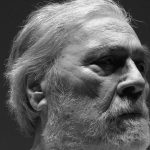
ASILO (Asylum)
To introduce Life is dream – created by Lenz Fondazione for Parma Italian Capital of Culture 2020+21 – Maria Federica Maestri and Francesco Pititto have produced three performances, Asilo, Altro stato and Hipógrifo violento, which will have as protagonists some fundamental characters of Calderón de la Barca’s masterpiece: Father Basilio, the beloved Rosaura and the servant Clarino.
The protagonist of Asylum (performance on video) is the Father, King Basil – played by Rocco Caccavari, who in the great virtual ‘Reading Room’ of his existence will look for the scientific reasons for his cruelty towards his Son.
In Life is dream the protagonist – Prince Sigismondo – excluded from birth, through no fault of his own, from the human consortium, is locked up by his father in a tower, since he is destined by an astral design to be evil. In order to be sure that the Son is capable of pursuing the good, and therefore of succeeding him to the throne, Father Basil puts the young Prince to the test of the world.
Temporarily reintegrated, through an artificial sleep, into the social game will have to be able to overturn his black destiny, but unable to control instincts and desires, to exercise appropriate behaviour towards authority, to comply with the rules, rules and laws, to perceive the difference between good and evil, he will be condemned again to imprisonment and social marginalization.
Only the People, in open contrast with the King’s decisions, will be able to see the true nature of the Prince and take him to the head of the army to bring down the power of the old Father. The violence of reality absolves the blame, dissolves the conflict by restoring the hierarchies and putting an end to the dream of revolution.
The spatial transposition of the multiple conceptual, emotional, moral fields manifested in the various and contrasting psychic states of the protagonists will give plastic volume to the dramaturgical oscillation between reality and dream, between freedom and constraint, between arbitrariness and destiny.
To interpret the complexity of the work are called sensitive actors, historical actors of Lenz and pre-artistic personalities of great human and intellectual depth, symbolic figures of the civil and political history of the city of Parma, such as Rocco Caccavari.
Through the multiple artistic forms – installations, performances, video projections, musical dramaturgies between baroque, modern and contemporary – this perturbing, noisy, disorganic, disjointed dimension expands beyond the boundaries of the subject and is transformed into a new common time freed from social conventions and norms, necessary to imagine, or dream of, as in the case of the young protagonist, a possible poetic and political transformation of collective identity.
Rocco Francesco Caccavari was born in Girifalco (Catanzaro) on 22 December 1938. First responsible in 1976 for the Drug Addiction Service (Ser.T.) of Parma after the law 685/75. Head of Internal Medicine, he worked for many years with the Ministry of the Interior and Health as a consultant. City Councillor for 14 years, in 1992 he was elected to the Chamber of Deputies where he was present for three legislatures (XI, XII, XII). In particular, the law on the reorganization of the thermal system of 2000, law 125/2001 on alcoholism and related pathologies and law 130/2001 on the cremation of corpses and dispersion of ashes are linked to his name. He founded the “Marino Savini” Association for the defence of Public Health and the SO.CREM Cremation Society of Parma. He is honorary president of Lenz Foundation, and for many years has held the presidency of Natura Dèi Teatri, Cultural Association that since 1995 organizes, among other things, an important International Festival of Performing Arts with performances performed by actresses and sensitive actors with difficult experiences for physical and mental discomfort. He is a member of the jury that every year awards the national literary prize “Flaminio Musa” for Italian medical writers. As a performer he made his debut in 2015 at Festival Verdi in the show Verdi Re Lear, a Lenz Fondazione production directed by Francesco Pititto and original music by Robin Rimbaud aka Scanner. In 2020, for Parma, the Italian Capital of Culture, he plays Asilo, part of the tetralogy of suns that Lenz dedicates to the texts of the Spanish Baroque author Pedro Calderón de la Barca.
ASYLUM
from Life is dream by Pedro Calderón de la Barca
Translation, dramaturgy, imagoturgy, direction | Francesco Pititto
Installation, plastic elements, direction | Maria Federica Maestri
Music | Claudio Rocchetti
Interpreter | Rocco Caccavari
Care | Elena Sorbi
Organization | Ilaria Stocchi
Press office, communication, promotion | Michele Pascarella
Technical care | Alice Scartapacchio
Assistant | Marco Cavellini
Production | Lenz Foundation
Duration | 20 minutes









